Tied pubs - Scottish Pubs Code: consultation 3 – analysis report
This summary presents key themes from the analysis of responses to a public consultation on a Scottish Pubs Code for tied pubs (the Code). This was the third consultation on this subject.
2. Market Rent Only leases
Market Rent Only (MRO) leases are provided for in Schedule 1 of the Act, requiring that the landlord must, in certain circumstances, offer a tenant a lease which does not include any product or service ties. A number of exemptions to the requirement to offer MRO leases are set out in Part 4 of the draft Code.
Notice to end the lease
One of these is that MRO leases need not be offered by a pub-owning business where either the tenant or the pub-owning business has served a valid notice to bring the lease to an end. It is recognised that both parties should have the right to end the contractual relationship. Following concerns from some stakeholders, it is proposed that Regulation 3 of the draft Code should be amended to make it clearer that the MRO exemption only applies where a pub-owning business or tied pub tenant has not served a notice to bring the lease to an end before a specified period of time before the end date of the lease.
Question 1: Do you agree or disagree with the following statement?
‘In the case of a notice to quit, MRO exemption only applies where a pub-owning business or tied pub tenant has not served a notice to bring the lease to an end before a specified period of time before the end date of the lease.’
Responses to Question 1 by respondent type are set out in Chart 1 below.
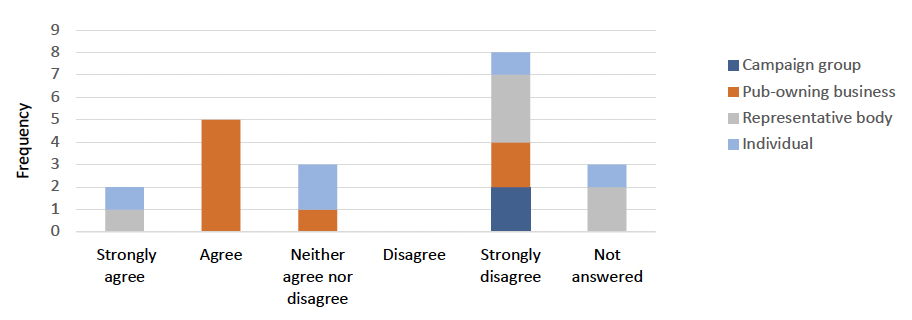
Respondents were divided on this issue, with eight strongly disagreeing and seven either agreeing or strongly agreeing. Three respondents neither agreed nor disagreed.
Respondents were divided on whether ‘In the case of a notice to quit, MRO exemption only applies where a pub-owning business or tied pub tenant has not served a notice to bring the lease to an end before a specified period of time before the end date of the lease.’ Overall, Pub-owning businesses tended to agree with the proposal as worded, as did the major representative body for tenants’. However, two Pub-owning businesses and the major representative body for pub-owning businesses strongly disagreed. Campaign groups and other Representative bodies also tended to strongly disagree.
Please explain your answer.
Fourteen respondents explained their reasoning.
Reasons for disagreeing with the proposal
The need for this proposal was questioned, supported by a view that it is trying to solve something that would not happen in practice (Major representative body for pub-owning businesses).
However, it was also noted that any approach which sought to frustrate or prevent a tenant applying for an MRO lease (as permitted) would go against the stated regulatory principles of the Code (Major representative body for pub-owning businesses). Specific reasons why the proposed change is not required/appropriate, included suggestions that:
- Section 19 of the Act imposes a specific requirement on the Pubs Code Adjudicator to report cases of pub-owning businesses engaging in avoidance activity (Major representative body for pub-owning businesses, Pub-owning business).
- The ability to serve a notice to quit is detailed in the lease and sits outside the Code (Major representative body for pub-owning businesses).
The Major representative body for pub-owning businesses and two Pub-owning business respondents went on to suggest that, if the regulations are amended as per the proposal, any amendments, should differentiate between fault break notices in responses to a breach of the lease, and no fault notices that may feature in the terms of the lease. The Pub-owning business also commented that any notice clauses contained within agreements would need to be agreed between both parties at the outset; they thought that it should remain the right of a prospective tenant to take on an agreement in full knowledge of any contained notice to quit clause and the impact such a clause would have on their MRO rights during the proposed tenure.
The Campaign group perspective, along with a that of another Representative body, was very different. For example, the Campaign group respondents argued that pub-owning businesses will serve notice routinely to avoid MRO, while the Representative body was concerned that the proposal could actually encourage pub-owning businesses to exercise a degree of brinkmanship, for example by saying they intend to take a pub back but then offering the existing tenant a new contract, with less favourable contract terms, at the last minute. While others who had disagreed thought the proposed amendments are not necessary, these respondents were looking for more rigorous arrangements, including oversight, to ensure that pub-owning businesses cannot avoid offering MRO leases when required. Suggestions included there being no exemption to the right to go MRO throughout the lease (Campaign group).
Comments in support of the proposal
Those who had agreed with the proposal sometimes acknowledged that the draft code has left a loophole (Major representative body for tenants) or commented that they could see that the exemption concerned could be used to frustrate the proper operation of the right to serve an MRO notice (two Pub-owning businesses).
One of the Pub-owning businesses making this point went on to note that, while in principle they are not against an anti-avoidance measure, care needs to be taken to ensure that it is correctly drafted and there are no unintended consequences.
Specific suggestions as to how any amendment should be framed/set out included that any anti-avoidance measure should be limited to type 1 notices, i.e. those intended to prevent a lease from continuing under tacit relocation, and should not apply to a notice to terminate on the grounds that the tenant is in breach of the lease or a break notice. The Pub-owning business respondent making this point also noted that there may be legitimate reasons why a landlord would want to serve a type 1 notice at the start of the term of the lease or early into it (for example, relating to redevelopment plans) and suggested that an unintended consequence of preventing serving a notice under these circumstances could be to impede the development/renovation of pubs. Their proposed solution was that, rather than prohibiting service of notices to quit during a specified period of the term, any provision should be based on restricting the exemption to notices served in the last 6 months of the term or during a period of tacit relocation.
The same respondent also called for a broader MRO opt-out option, with a tenant able to sign an opt-out from the MRO option in exchange for a longer-term agreement and greater capital support from the pub-owning business.
Question 2: If a timeframe were to be specified, what should that be?
Responses to Question 2 by respondent type are set out in Chart 2 below.

The fifteen respondents who answered this question divided relatively evenly across the three options:
- Seven respondents, including four Pub-owning business, favoured the longer timeframe of more than 3 months.
- Four respondents each supported the 3 months, or less than 3 months options. In both cases this was a mix of Pub-owning businesses, Representative bodies and Individual respondents.
The online response form did not ask for comments at Question 2. However, two respondents did make a follow up comment:
- A Pub owning business that favoured the period of more than 3 months suggested that a period of 6 months would be appropriate. They considered parties being potentially pulled into the MRO process within the last 6 months of a lease as a waste of time and resources.
- The Major representative body for pub-owning businesses favoured a period of less than 3 months and commented that it would not be practical for a tenant to seek MRO for a period of less than 3 months at the end of the lease as there would not be enough time for the MRO process to take place and the tenant to get any benefits of going MRO.
First half of the lease: earlier application process
The draft Code includes an exemption that an MRO lease need not be offered in the first half of the lease. This was proposed at a time when 5-year leases were common but shorter leases are now being offered, for example for 3 years or less. If an MRO lease need not be offered in the first half of the lease, shorter leases mean that MRO will be an option for tenants for a shorter period of their lease than was originally envisaged.
To reflect this, it is proposed that the MRO process should start before the half-way point of any lease, such that a new lease could start at the half-way point of the existing lease. MRO leases are not required to be longer than the remainder of the existing lease and so this would give any tenants who chose to go MRO more time to realise any benefits of going MRO.
Question 3: Do you agree or disagree with the following statement?
‘The Market Rent Only process should be able to start before the half-way point of a tenancy.’
Responses to Question 3 by respondent type are set out in Chart 3 below.
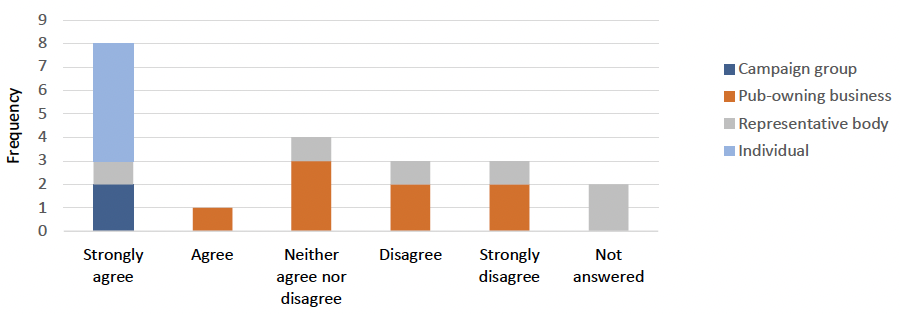
Individual and Campaign group respondents tended to agree that the MRO process should be able to start before the half-way point of a tenancy. Pub-owning businesses and Representative bodies tended to divide between neither agreeing nor disagreeing and disagreeing (both disagreeing and strongly disagreeing).
Please explain your answer.
Eighteen respondents provided an explanation.
Comments in support of the proposal
Those who agreed with the proposal sometimes noted their general concerns about pub-owning businesses delaying the MRO process, thus minimising any time a tenant has to utilise their rights to MRO under the code. An associated point, from a Campaign group respondent, was that the current Code terms are overly complex and open to abuse.
Other comments addressed the timeframe as proposed and included that a tenant must be able to start the process sufficiently in advance such that the entire process, including any arbitration or appeals to valuations, can be concluded prior to the earliest date MRO can take effect (Major representative body for tenants).
Suggestions for alternative (or additional) timeframe-related arrangements to those proposed were that:
- MRO requests should be available within 28 days of the start of a tied lease (Individual respondent).
- Tenants must be able to operate on MRO basis for at least 2 years of any lease and at least half of any lease (Campaign group).
- Renewing tenants should not have to wait 50% of the length of the renewed tenancy to be offered an MRO lease (Campaign group).
Although supporting the proposal as an improvement, a Campaign group and an Individual respondent considered that there should not be an exemption that an MRO lease need not be offered in the first half of the lease.
Reasons for disagreeing with the proposal
Amongst the issues raised by those who disagreed with the MRO process being able to start before the half-way point of a tenancy was that no legislation is required (Pub-owning business) and that, while uncertainty created by the Scottish Pubs Code has resulted in a temporary reduction of the length of leases currently being offered, 60% of current leases are still longer than 3 years, with 38% of those agreements being 10 years or longer (Major representative body for pub-owning businesses).
It was also suggested that, when a lease is signed, the parties are agreeing to its terms and that it is fair that pub-owning businesses have some certainty as to their contractual commitments and the commitments of their tenants, at least for an initial period of time (Pub-owning business).
Moving forward, it was suggested that the proposal could lead to unintended consequences which would distort the market (Pub-owning business). There was reference to:
- Short-term leases (of 1 year or less) being offered to remove any incentive for a tenant to go free-of-tie; and/or
- Businesses looking at alternative business models, such as quasi-managed agreements, or taking the pub back and running it as a traditional managed pub.
Further, a Pub-owning business respondent reported that – with the legal challenge to the legislation now concluded – they are keen to recommence investment in their Scottish tied estate but that for investment to make sense financially, a longer lease is required; their assessment was that shorter leases are a transient feature that are unlikely to continue in the longer term and that, by extension, the proposed provision is not required.
Other reasons given for disagreeing with the proposal included a view that a tied pub tenant under a 3-year lease would be unlikely to wish to go free-of-tie; reasons given included that the tenant is entering into a lease because they are attracted by the tied model and are likely to wait at least a year before making any decision on an alternative free-of-tie model even, if it were legally possible.
A very different perspective, and one which highlighted some of the issues raised by those who had agreed but had suggested alternative timescales etc, was that an MRO lease needs to be available on demand at any time. The Representative body making this argument went to comment that, potentially forcing a loss-making tenant to continue to make a loss for more than half of the lease period (accounting for time taken for any third-party determination) is not within the spirit of the Act and does not rebalance risk and reward.
Issues for consideration
A Pub-owning business commented that the tied pub model relies on long serving relationships founded on mutually sustainable success and that the Code should look to protect this rather than endanger it. Another noted that any change to the regulations and timescales involved will inevitably have consequences for the types of agreements that pub-owning businesses will be able to offer. Respondents, including some who had ‘neither agreed nor disagreed’ that the MRO process should be able to start before the half-way point of a tenancy, highlighted issues to be considered if making any changes to the Code. These included that:
- If the MRO process is to begin in advance of the halfway point of a tenancy, then this must be less than six months before the halfway point. This would allow for sufficient time to negotiate and agree on terms with the go live date being the halfway point of the tenancy (Pub-owning business).
- Consideration should be given to when an MRO application window closes post the half-way point. It was reported that this window or event-led MRO process has worked well in England and Wales and would provide the balance of preserving the rights of a tenant as well as trying to preserve the requirement for certainty for parties in continuing their ongoing landlord-tenant relationship (Pub-owning business).
- It is commonplace in the market for lease renewals to be dealt with by deeds of variation extending the term. Regulation 15(2)(a) should be amended to make clear that “term” means the term of the lease or (where extended) the period of the extension only (Pub-owning business).
Other issues raised included that:
- The period for the start of the process needs to be consistent with the date of the valuation (Pub-owning business).
- The Code should include an express provision setting out that the new MRO agreement only starts at the halfway point of the agreement and not at application (Pub-owning business).
Question 4: If the Market Rent Only process were to start before the half-way point of a tenancy, how soon should it start?
Responses to Question 4 by respondent type are set out in Chart 4 below.
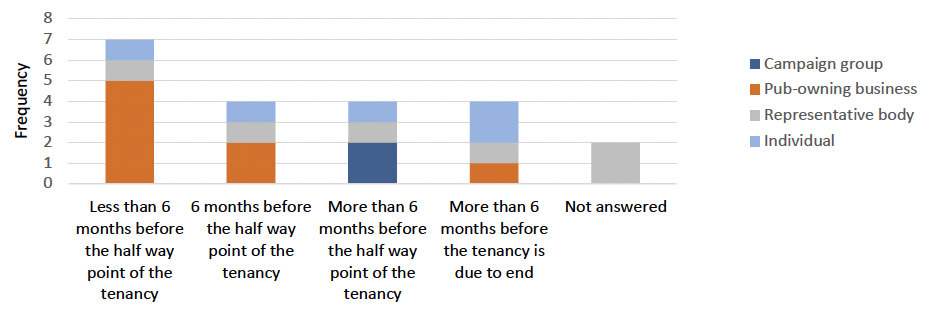
Respondents, and in particular Pub-owning businesses, were most likely to favour the ‘Less than 6 months’ option (7 out of the 19 respondents who answered the question and 5 of the 8 Pub-owning businesses). Otherwise, respondents divided across the other three options, with four respondents favouring each.
Please explain your answer.
Sixteen respondents explained their answer, with some referring back to comments at the previous question.
Less than 6 months
Comments included that the less than 6 months option would allow a sufficient period of a tenancy for there to be changes to business costs and rates and retail pricing (Pub-owning business).
Other reasons for favouring the shorter timeframe included that it could:
- Encourage more active negotiations (Pub-owning business).
- Prevent pub owners from offering short tenancies in order to effectively block requests for MRO (Individual).
There were also suggestions that the timeframe should be 3 months (Major representative body for pub-owning businesses and Pub-owning business) or should start at around 3 months (Pub-owning business).
Finally, a Pub-owning business called for consideration to be given to how disputes are to be resolved should they occur.
6 months before the halfway point
A Pub-owning business respondent suggested that, based on their experience of the MRO process in England and Wales, starting the MRO process 6 months before the halfway point of the tenancy term will allow sufficient time for the process to conclude.
Another commented that they had no issue with negotiations beginning prior to the half-way point, with a view to the MRO being in place at or around the half-way point (Pub-owning business).
Alternative suggestions to more than 6 months
Reflecting comments at the previous question, respondents who had selected either ‘More than 6 months before the halfway point’ or ‘More than 6 months before the tenancy is due to end’ tended to suggest further alternatives, for example:
- At least 12 months prior to the earliest date MRO can take effect (Major representative body for tenants).
- In plenty of time for it to come into force at the halfway point of the tenancy (Campaign group).
- Not later than a year into any agreement (Campaign group).
- On demand (Representative body, Individual).
- At any point except when there has been an investment exemption put in place (Individual).
Further suggestions included that a maximum time for the MRO process should be set, and that this should not be more than 90-days or 3 months (Campaign group).
Question 5: What would be the costs and benefits, if any, on your business and the sector?
Fourteen respondents answered Question 5.
A general point, made by a Pub-owning business, was that it is fair that all parties in the sector have an element of certainty within their business, with tenants entitled to know where they stand in relation to the contractual terms of their lease and wider arrangements with pub-owning businesses, and pub-owning businesses entitled to know where they stand, to allow them to plan effectively for the future of their businesses.
However, another Pub-owning business voiced their concerns that the first few years of legislation in England and Wales were fraught with unintended consequences, differing interpretations and significant dispute. They went on to call on the Scottish Government to consider likely unintended consequences, especially if these could result in less sustainable agreements and the accelerated erosion of tied pub numbers across the Scottish pub sector.
Potential costs
At its simplest, a Pub-owning business noted that the direct cost to them would be a reduction in tied income from the halfway point of an agreement. In terms of the impact on the sector overall, suggested costs included:
- Pub-operating businesses deciding to leave the leased and tenanted sector, thus reducing the choice and opportunities for future Scottish tenants (Pub-owning business).
- Reduced investment from pub-owning businesses (Pub-owning businesses).
- Tenants seeing an increase in repair and statutory testing and maintenance costs normally covered by larger pub-owning businesses (Pub-owning business).
Potential process-related costs identified related to the engagement of solicitors and surveyors (Individual).
It was also suggested that there would be a risk associated with any rent assessment being carried out ahead of time and being informed by information that is not up to date/accurate (Pub-owning business).
Potential benefits
In terms of potential benefits, a Campaign group reported that consumers and communities want to see a sustainable tenanted sector, with pubs continuing to serve local people rather than face closure. Another Campaign group respondent commented that tenants need to be able to take a fair share of the profits to make a living, but that this does not happen currently under too many tied agreements, which is why change is needed.
In terms of specific benefits, the following were suggested as possible:
- Pub-owning businesses would be forced to reduce tied prices and rents and offer more realistic, fairer agreements, to have a chance of persuading tenants to remain tied (Campaign group).
- Tenants who choose to go MRO would be able to operate more entrepreneurially and buy beer and all products and services from whomever they choose and whatever suppliers they believe suits their customers. An associated suggestion was that more MRO pubs would be a huge boost for Scotland’s independent brewing sector (Campaign group).
Right to appeal
The draft Code provides that, where the parties cannot agree the rent for the MRO lease, they can seek an independent rent assessment. Representatives of pub-owning businesses have suggested that there should be a process to appeal the rent assessor’s result if there is a clear error, while a key concern for tenants is around delays in the MRO process.
It is therefore proposed that an appeals process should be introduced, to enable parties to appeal the rent assessment if there is a clear error. To address concerns about delays, it is proposed that this appeal process should occur within the MRO offer process. In other words, appeals can be raised with the Adjudicator within 14 days of the rent determination, i.e. to run concurrently with the period in which pub-owning businesses are preparing the MRO offer when the rent assessor has confirmed the rent assessment. The appeal could be made by the pub-owning business or the tenant.
Question 6: Do you agree or disagree with the following statement?
‘There should be a process to appeal the result from the independent rent assessor.’
Responses to Question 6 by respondent type are set out in Chart 5 below.
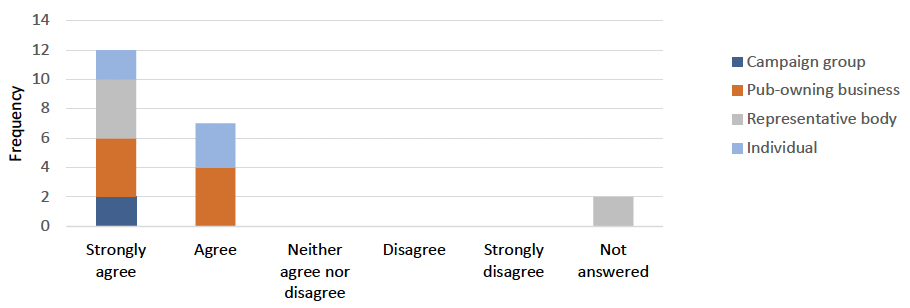
All of those who answered the question either strongly agreed or agreed that there should be a process to appeal the result from the independent rent assessor.
Please explain your answer.
Sixteen respondents gave their reasoning and, reflecting the consensus at the closed question, a small number of common themes emerged. These were that it will be important that the assessment is, and is seen to be, completely fair and that it is right and necessary that there are means of challenge for both sides.
In terms of the likelihood/frequency of an error having been made, one perspective was that the majority of independent rent assessments are correct, (Pub-owning business and the Major representative body for pub-owning businesses). However, there was also a suggestion that independent assessors tend to work for the benefit of the company/person paying them (Individual) and it was reported that several assessments have been appealed successfully under the auspices of the England and Wales Pubs Code (Representative body).
In terms of how any appeal process should work, a number of respondents referred to the importance of an error in assessment being clear or manifest, with other approach-related suggestions including that there should be safeguards to make sure that parties do not exploit the appeal route in order to delay or frustrate the MRO-only process (two Campaign groups). There was an associated call for a clear and time-limited process (Campaign group).
It was also seen as important that the grounds for appeal are limited and very clearly set out, (Pub-owning business) with a further suggestion being that any right to appeal should be in line with the Code in England and Wales.
Other comments and suggestions, relating to both the assessment and any appeal process, included that:
- There must be clear guidelines for the independent rent assessment itself (Campaign group).
- To help inform any requirement for an appeal, independent assessors should clearly set out the reasoning that supports their rent assessment/decision (Pub-owning business and Representative body).
- The regulator should produce a list of approved assessors. (Individual).
There was also a call for valuers to be regulated (Representative body).
Question 7: Do you agree or disagree with the following statement?
‘14 days is the right amount of time for either party to appeal the result.’
Responses to Question 7 by respondent type are set out in Chart 6 below.
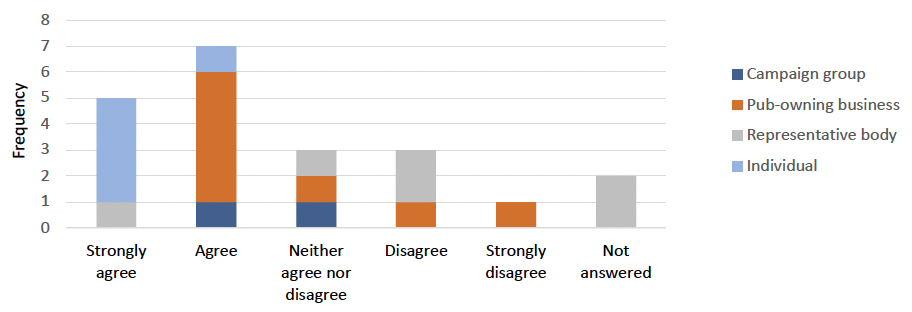
A majority of respondents (12 out of the 19 respondents who answered the question) either strongly agreed or agreed that 14 days is the right amount of time for either party to appeal the result. This included all five Individual respondents and five of the Pub-owning businesses).
Three respondents neither agreed nor disagreed, and four disagreed or strongly disagreed. The latter group was made up of two Pub-owning businesses and two Representative bodies.
Please explain your answer.
Fifteen respondents gave their reasons, albeit comments tended to be brief.
Those who agreed sometimes simply noted that 14 days appears appropriate or reasonable (two Pub-owning businesses) and reflects the need of both parties for a time-efficient process (two Individuals and a Representative body).
Other reasons for supporting 14-day timescale included that it is in line with the Pubs Code in England and Wales, suggesting it is sufficient without causing any undue delays to the MRO process (Pub-owning business).
Two respondents who had answered that they neither agreed nor disagreed (a Pub-owning business and the Major representative body for pub-owning businesses), commented that 14 days is a suitable period of time for the review of any result of the independent rent assessor, but would not be sufficient to set out in detail the grounds for the appeal which will need to follow later. They suggested that the regulation should make it clear that all that is required is that the party notifies the other party and the Adjudicator of their intention to appeal, with further provisions setting out when detailed grounds are required.
However, those who disagreed (and to an extent those who had neither agreed nor disagreed) tended to see the 14-day period as too short. It was suggested, for example, that it would make no allowances for holidays (two Pub-owning businesses and a Representative body), the challenges of managing their workload for small businesses (Pub-owning business), or the availability of independent advice (Pub-owning business). A Campaign group respondent (who had answered that they neither agreed nor disagreed) reported that feedback from tenants and professionals involved in providing specialist advice to tenants in England and Wales suggests that the current time limits in that code are too restrictive and are preventing tenants from accessing and properly considering issues.
Alternative suggested timescales were 28 days (three Pub-owning businesses and a Representative body) or 30 days (Major representative body for tenants).
Question 8: Should the time period for the appeal be included in the 4-week period to create a MRO offer or should it be additional to this?
Responses to Question 8 by respondent type are set out in Chart 7 below.

Respondents, including all of the Pub-owning businesses and Representative bodies who answered the question, were most likely to think that the time period for the appeal should be additional to the 4-week period to create an MRO offer. However, four Individuals thought the 14-day period should be included in the 4-week period.
Please explain your answer.
Fourteen respondents provided a comment at this question, with two Pub-owning businesses and the Major representative body for pub-owning businesses providing detailed suggestions concerning how Regulation 17 should be redrafted. These included that:
- The rent assessor is only appointed once the terms of the MRO lease have been agreed or determined to be compliant by the Adjudicator; and
- The tied pub tenant is not required to accept or reject the offer of an MRO lease unless and until all the terms (rent and other terms) have been agreed or so determined.
They went on to comment that, if the Scottish Government is not minded to redraft Regulation 17, any appeal against the rent assessment should not be commenced until the terms of the new lease have been agreed or determined.
Other points raised by respondents who thought the time period for the appeal should be additional to the 4-week period for the appeal included that tenants need all the facts in front of them before coming to a decision (Representative body) and that the proposed rent cannot be determined until the MRO lease terms have been agreed. (three Pub-owning businesses).
Those who thought the time period for the appeal should be included in the 4-week period to create an MRO offer pointed to the need to avoid any unnecessary delays in the process (two Individual respondents).
Contact
Email: tiedpubs@gov.scot
There is a problem
Thanks for your feedback